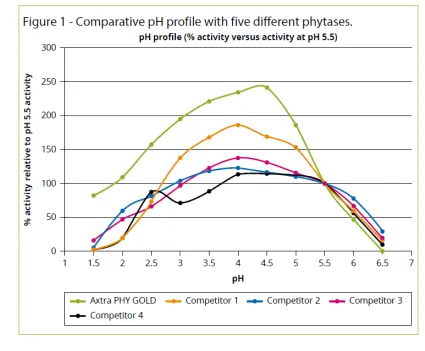DuPont Nutrition & Biosciences has developed Axtra® PHY GOLD to provide phosphate supplementation in animal feeds, resulting in improved performance and providing a better environmental footprint
To improve phosphorus availability and tackle the antinutritional effects of phytates, phytases have been increasingly used in animal feeds over the past 30 years. Effective phytases are available on the market, but there is still room for improvement.
An ideal phytase should be active in the low-pH environment of the stomach to begin phytate hydrolysis as soon as possible. It should also resist high temperatures during the pelleting process and should have a high specific activity at physiological temperatures. The commercial phytases currently available perform differently in the laboratory, and thus vary in their effects on animal performance.
The enzyme that currently has the highest bioefficacy and activity at low pH is a Buttiauxella phytase, which acts twice as fast as its direct competitors to ensure that most of the phytate is hydrolysed in the early stages of digestion, which take place in gut sections where pH is considerably lower than in subsequent sections. Enzymes with a superior pH profile will thus hydrolyse phytate in the upper part of the digestive tract as quickly as possible to effectively reduce the antinutritional effect of phytate.
Pelleting, a process widely used in feed production in which high temperature and pressure are used, also impairs the stability of added feed enzymes. However, the phytase market is continuing to develop and test novel enzymes and formulations in an effort to find new, more suitable enzymes that can cope with the challenges faced during feed production and are tailored for optimal nutrition.

These above-mentioned bioefficacious phytase was further improved, resulting in the new Axtra® PHY GOLD. Its performance in vitro followed by in vivo trials validated how it excels at replacing phosphate supplementation in animal feeds. The new product had superior thermostability, enabled the total removal of inorganic phosphate from plant-based diets, improved performance and resulted in a better environmental footprint. It also proved to be especially useful for premixers that have no control over their final customer’s pelleting conditions. Because even great enzyme performers can still be improved, enzyme tailoring remains a field worth continued exploration.
For more information, visit www.animalnutrition.dupont.com/AxtraPHYGOLD




